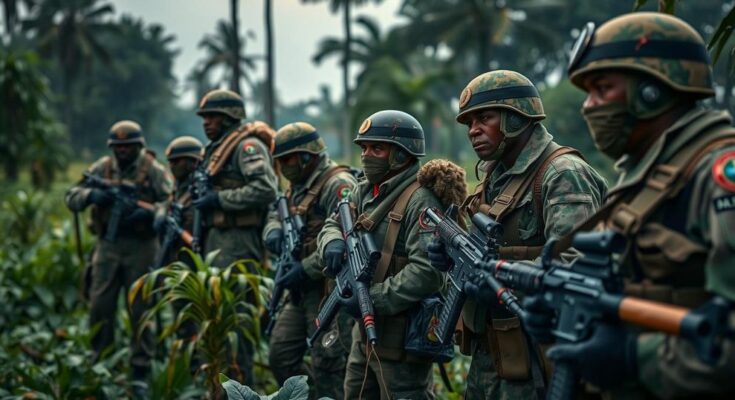The Congolese government has accused the M23 rebel group, which is reportedly backed by Rwanda, of committing ethnic cleansing in eastern Congo. This accusation follows the group’s recent establishment of control over specific territories, amid ongoing violence and a humanitarian crisis affecting millions. Despite a ceasefire, tensions remain high due to continued clashes between M23 and other militias.
The government of Congo has vehemently accused the M23 rebel group, allegedly supported by Rwanda, of committing acts of ethnic cleansing in the eastern region of the country. During a recent statement, Minister of the Interior, Jacquemain Shabani, condemned the violent expulsion of local populations in North Kivu’s Rutshuru and Masisi territories, leading to the influx of foreign populations. “This is what constitutes ethnic cleansing,” declared Shabani, reflecting the gravity of the situation. The government’s accusations intensified following M23’s recent establishment of local administrations in areas it claims to control, raising alarms about the escalating violence in a region fraught with conflict. Over 100 armed groups are competing for dominance in eastern Congo, which is rich in minerals. The resurgence of M23 is particularly troubling, contributing to a humanitarian crisis affecting over seven million displaced individuals, many of whom are inaccessible to aid services. Originating from ethnic Tutsi factions, the M23 rebel group dissociated from the Congolese army about a decade ago. They gained notoriety in 2012 when they captured Goma, the largest city in eastern Congo bordering Rwanda. Moreover, the Congolese government has implicated Rwanda in war crimes linked to the ongoing conflict, amid accusations from U.S. and U.N. experts that Rwanda provides military assistance to M23. Although Rwanda has refuted these allegations, it acknowledged earlier this year that its military presence, including troops and missile systems, is in place for national security reasons in response to growing Congolese troop movements near the border. Reports suggest the presence of approximately 4,000 Rwandan troops in eastern Congo. Despite a July ceasefire, facilitated by diplomatic interventions from the United States and Angola, conflicts persist. Violent clashes between M23 and pro-government militias, which resulted in the deaths of 16 villagers in August, highlight the fragility of the truce and the ongoing threat to the stability of the region.
The conflict in eastern Congo has deep historical roots, exacerbated by ethnic tensions, territorial disputes, and foreign involvement. The M23 rebel group, which primarily comprises ethnic Tutsis, has a history of conflict with the Congolese government, marked by accusations of genocide and war crimes. The region itself is a hotspot for multiple armed factions vying for control over valuable mineral resources. International dynamics play a significant role, particularly the alleged support from Rwanda for M23, creating a complex environment that complicates peace-building efforts and humanitarian assistance.
In summary, the allegations of ethnic cleansing levied against the M23 rebel group by the Congolese government underscore the severe humanitarian crisis unfolding in eastern Congo. The ongoing violence, external influences, and failed truces highlight the complexity of the conflict, as local populations suffer amidst the chaos. The situation necessitates urgent attention and action from both regional and international actors to alleviate the growing humanitarian toll and restore stability in the region.
Original Source: apnews.com




